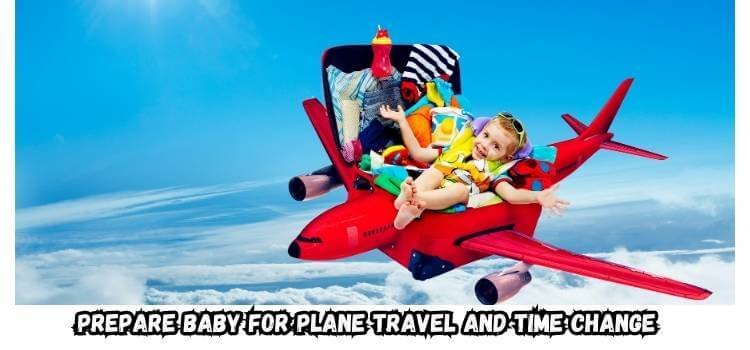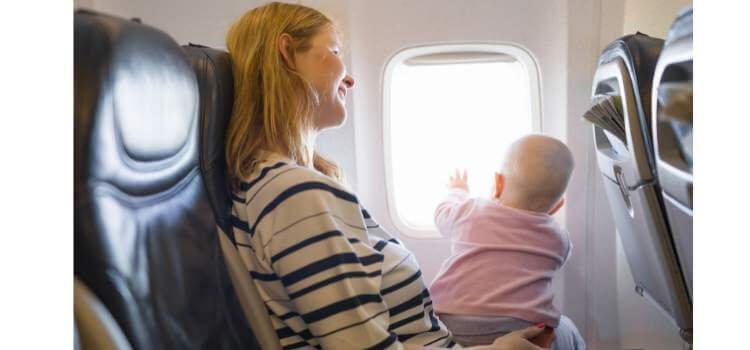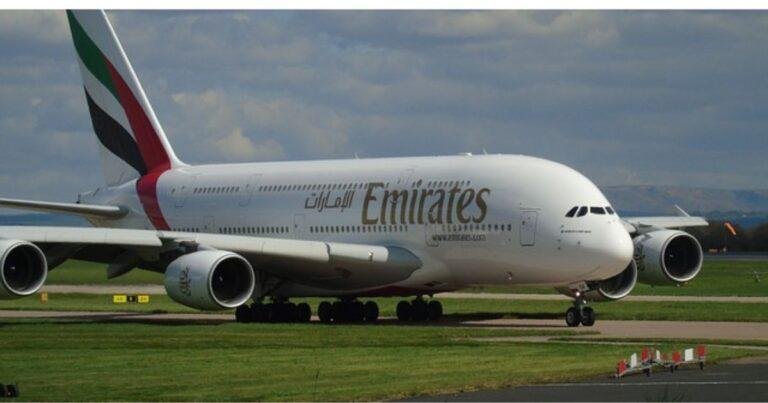In this post, we provide you with tips on how to prepare your baby for travel. We will cover the best ways to keep your baby comfortable during flights and at the same time make sure they are well-rested for the new time zone.
Traveling with a baby can be a rewarding experience, but it also requires careful planning to ensure a smooth journey for both you and your little one. From packing the right essentials to managing time zone changes, every detail counts.

The best way to get your baby ready for travel is to make sure they are sleeping well before you leave. If you are going to be flying, try to make sure you get your baby to sleep a few hours before you have to leave. If you have to take a long flight, try to make sure you give your baby a bottle of milk or formula. It is also important to make sure your baby is eating well. Read also about the Portable Toddler Bed with Rails For Peaceful Baby Traveling
Packing Essentials for Baby Travel
Packing efficiently for your baby’s plane travel is essential to avoid unnecessary stress during the journey. Here’s a list of must-have items to consider:
- Diapers and Changing Supplies: Ensure you have an adequate supply of diapers, wipes, diaper rash cream, and changing pads. Changing diapers in-flight is a common task, so be prepared.
- Feeding Essentials: If your baby is bottle-fed, pack enough formula, bottles, and sterilized water. For breastfeeding, consider a nursing cover for privacy.
- Comfort Items: Bring along your baby’s favorite blanket, pacifiers, and toys to provide comfort and distraction during the flight.
- Clothing: Pack extra sets of clothing, including layers, as airplane cabins can vary in temperature.
- Medications: If your baby requires any medications, have them in their original containers and carry the necessary prescriptions.
- Travel Stroller or Carrier: Opt for a compact stroller or a comfortable baby carrier for ease of movement in the airport.
Managing Time Zone Changes
Time zone changes can disrupt your baby’s sleep routine and overall schedule. Here’s how to minimize the impact:
- Pre-Trip Adjustment: A few days before your trip, gradually adjust your baby’s sleep and feeding times by 15-30 minutes each day, depending on the time zone difference.
- In-Flight Strategies: During the flight, try to stick to the local time of your destination. Keep your baby awake if it’s daytime at your destination, and encourage sleep if it’s nighttime.
- Exposure to Natural Light: Upon arrival, expose your baby to natural daylight during daytime hours. This helps regulate their internal body clock and adapt to the new time zone.
- Consistent Routine: As soon as you arrive, establish a consistent daily routine that aligns with the local time. This includes feeding, napping, and bedtime.
Dealing with Jet Lag
Jet lag can affect both adults and babies, causing irritability and disrupted sleep. Here’s how to alleviate its effects:
- Hydration and Nutrition: Keep your baby well-hydrated and ensure they’re eating balanced meals. Proper nutrition can aid in adjusting to the new time zone.
- Gradual Transition: Be patient as your baby adapts. It might take a few days for their internal clock to align with the new time zone.
- Outdoor Time: Spend time outdoors during daylight hours. Sunlight exposure helps regulate circadian rhythms and supports a smoother adjustment.
- Comfortable Sleep Environment: Ensure your baby’s sleep environment is conducive to restful sleep. Use blackout curtains if needed and maintain a comfortable room temperature.
When you’re traveling with a baby, you may have to adjust your plans. If you are going on a trip, you should make sure that you have everything ready so that you don’t have to worry about anything. Make sure that you have the right equipment for the trip. Make sure that you have everything that you need for the baby. You can also prepare the baby for the time change by making sure that you have a good night’s sleep.
Travel by Plan
If you want to prepare your baby for a flight or time change, you should make sure he is sleeping on his back with his head supported. This will help him to stay more comfortable during the trip.

Navigating airport security with a baby requires some extra preparation to ensure a hassle-free experience. Here’s what you need to know:
- Baby Essentials Screening: Many airports have specific procedures for screening baby items such as formula, breast milk, and baby food. Familiarize yourself with these rules to make the process smoother.
- Security Checkpoint Procedures: Be prepared to remove your baby from the stroller or carrier and carry them through the metal detector. Strollers and carriers will go through the X-ray machine.
- Carry-On Essentials: Keep your baby essentials easily accessible in your carry-on bag. This includes diapers, wipes, and any medications. Consider using clear zip-top bags for organization.
- Documentation: Have all necessary documentation on hand, including your baby’s passport and any required visas. It’s also a good idea to carry a copy of their birth certificate.
- Patience and Courtesy: Be patient and courteous with security personnel. Inform them if you have any special items like breast milk or medications that require separate screening.
Travel by Car
If you are traveling by car, you should make sure your baby is sleeping well and eating well. Make sure you have a good supply of snacks, such as fruit and vegetables, to keep your baby happy and healthy while you are on the road.
In-Flight Comfort and Entertainment
Ensuring your baby’s comfort and entertainment during the flight is crucial for a pleasant journey. Here are some tips:
- Seating: If possible, choose seats with extra legroom or near the bulkhead. This provides more space for your baby to move around and for you to store essential items.
- Feeding: During takeoff and landing, breastfeeding or bottle-feeding can help ease ear pressure for your baby. Pack extra formula or breast milk in case of delays.
- Entertainment: Bring a variety of toys and distractions to keep your baby engaged. Soft books, rattles, and interactive toys can help pass the time.
- Walks and Stretches: Take short walks with your baby up and down the aisle to prevent restlessness. Gentle stretches and movements can also help soothe your baby.
Post-Travel Adjustment
Upon reaching your destination, it’s important to help your baby adjust to the new environment and time zone. Here’s what to do:
- Rest and Recovery: Allow your baby time to recover from the journey. If the travel was particularly long, they might need additional rest.
- Gradual Routine Transition: Continue following the routine you established during your journey, and gradually adjust it to align with the local time zone.
- Hydration and Nutrition: Ensure your baby stays hydrated and maintains a healthy diet to aid in the adjustment process.
- Explore Gently: While you might be excited to explore your new surroundings, take it slow with your baby. Allow them time to adapt before embarking on extensive activities.
Finally: Prepare Baby for Plane Travel and Time Change
By following these comprehensive steps and strategies, you’ll be well-prepared to navigate plane travel and time changes with your baby. Remember that flexibility and preparation are key to ensuring a positive experience for both you and your little one. With careful planning and the right approach, you can create lasting memories during your journey while keeping your baby’s well-being a top priority.





